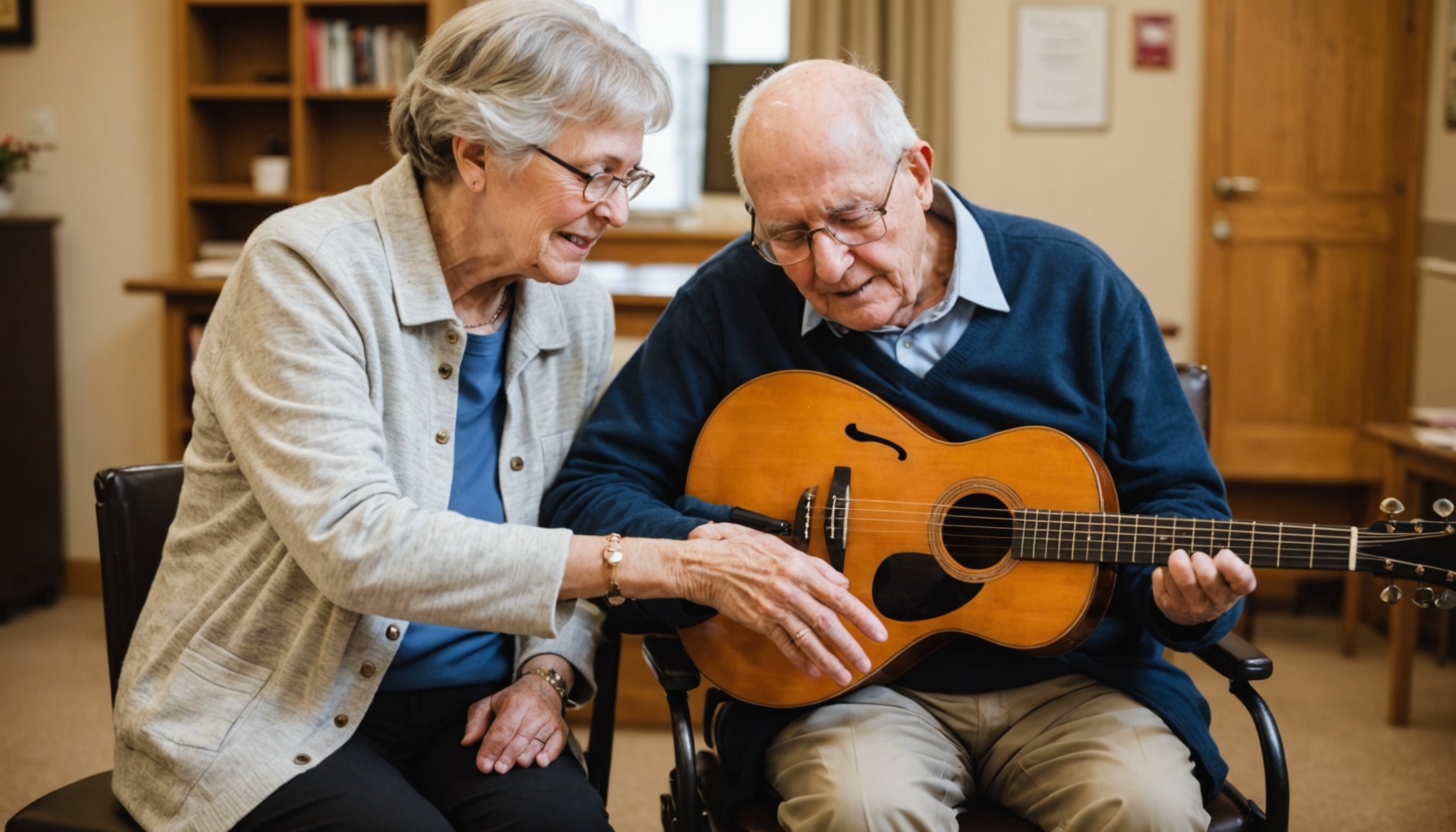Unlocking the Power of Music Therapy: Enhancing Cognitive Health in Seniors Facing Decline
As we age, the inevitability of cognitive decline can be a daunting prospect. However, there is a powerful tool that has been gaining recognition for its ability to enhance cognitive health and improve the quality of life for seniors: music therapy. In this article, we will delve into the world of music therapy, exploring its benefits, mechanisms, and practical applications for senior care.
The Science Behind Music Therapy
Music therapy is an evidence-based practice that harnesses the power of music to address physical, emotional, cognitive, and social needs. This is not just about listening to music; it involves specific musical interventions led by qualified therapists to tap into the complex neural processes of the brain.
In parallel : Unlocking Wellness: The Advantages of Regular Chiropractic Care for Seniors
How Music Affects the Brain
When we listen to music, multiple areas of the brain are activated simultaneously. This includes regions involved in emotion, memory, and cognitive processing. For seniors, this can be particularly beneficial as it helps in stimulating areas that may be affected by aging or cognitive decline.
For instance, the Gamma brain wave, which is associated with high-level information processing, learning, and memory recall, can be activated through specific sound frequencies. This is the principle behind tools like The Memory Wave, which uses brainwave entrainment to stimulate Gamma waves and enhance cognitive function.
This might interest you : Empowering Seniors: Dietary Strategies for Enhanced Bone Health and Osteoporosis Prevention
Benefits of Music Therapy for Seniors
Music therapy offers a wide range of benefits for seniors, particularly those facing cognitive decline.
Cognitive Benefits
Music therapy has been shown to improve cognitive functions in older adults. Here are some key cognitive benefits:
- Memory Improvement: Music can help in enhancing memory formation and recall. Studies have shown that individuals who engage in musical activities, such as singing or playing instruments, exhibit better memory performance compared to those who do not.
- Executive Functions: Research by Dr. Seinfeld found that older adults who took piano lessons showed significant improvements in executive functions, which include planning, decision-making, and problem-solving.
- Brain Clearance: The activation of Gamma waves through music can help in the brain’s waste clearance system, which is crucial for maintaining cognitive health and preventing conditions like Alzheimer’s disease.
Emotional and Social Benefits
Music therapy is not just about cognitive improvement; it also has profound emotional and social benefits.
- Emotional Well-being: Music has a way of lifting spirits and reducing symptoms of depression. Classical music, in particular, has been found to have a therapeutic effect on mental health, helping to alleviate symptoms of depression and anxiety.
- Social Interaction: Singing in community choirs or participating in group music therapy sessions can enhance social interaction and a sense of community among seniors. This social glue is essential for emotional well-being and can help combat loneliness and isolation.
Practical Applications of Music Therapy in Senior Care
Music therapy can be integrated into various settings, including assisted living facilities, home care, and memory care units.
Therapy Sessions
Music therapy sessions can be tailored to meet the specific needs of senior residents. Here are some examples of what these sessions might look like:
- Songwriting and Improvisation: These activities allow seniors to express themselves creatively, which can be therapeutic and help in memory recall.
- Guided Imagery: Using music to guide seniors through imagery exercises can help in relaxation and stress reduction.
- Group Singing: Singing together in a group setting can foster social interaction and a sense of belonging among seniors.
Personalized Music Programs
Organizations like Music & Memory provide personalized music programs that are tailored to the individual needs of seniors. These programs involve creating playlists of music that are meaningful to the individual, which can help in engaging them with the world around them and improving their quality of life.
Case Studies and Success Stories
There are numerous case studies and success stories that highlight the effectiveness of music therapy in enhancing cognitive health and quality of life for seniors.
Music & Memory Initiative
The Music & Memory initiative has been implemented in various care facilities with remarkable results. For example, a senior resident with dementia who had been non-verbal for years began singing along to her favorite songs after being introduced to the program. This not only improved her mood but also enhanced her social interaction and engagement with her environment.
Tips for Implementing Music Therapy at Home
While music therapy is best conducted by qualified therapists, there are several ways you can implement its principles at home to benefit your loved ones.
Create a Personalized Playlist
- Gather a list of your loved one’s favorite songs and create a playlist.
- Play this music regularly, especially during times of stress or when they seem disengaged.
Engage in Musical Activities
- Encourage your loved one to sing along or participate in simple musical activities like clapping or tapping to the rhythm.
- Consider enrolling them in local music classes or group singing sessions.
Use Sound Therapy Tools
- Tools like The Memory Wave can be used at home to stimulate Gamma waves and enhance cognitive function.
Table: Comparing Different Music Therapy Approaches
| Approach | Description | Benefits | Suitable For |
|---|---|---|---|
| Songwriting and Improvisation | Creative expression through music | Emotional well-being, memory recall | Seniors with creative inclinations |
| Guided Imagery | Using music to guide imagery exercises | Relaxation, stress reduction | Seniors with anxiety or stress |
| Group Singing | Singing together in a group setting | Social interaction, sense of belonging | Seniors in assisted living facilities |
| Personalized Music Programs | Tailored playlists of meaningful music | Engagement, mood improvement | Seniors with dementia or cognitive decline |
| Sound Therapy Tools | Using specific sound frequencies to stimulate brain waves | Cognitive improvement, brain clearance | Seniors facing cognitive decline |
Quotes from Experts and Seniors
- “Music has always been a go-to for lifting our spirits, but did you know classical music might take it a step further by actually helping treat depression?” – Dr. Anita Collins, Founder of Bigger Better Brains.
- “The Memory Wave embodies this innovative approach, offering a tool that enhances cognitive abilities and supports the underlying health of the brain.” – Sterling Medical Center.
- “Singing in a community choir is more than just a musical activity—it’s a powerful therapeutic experience that enhances brain health and emotional well-being.” – Bigger Better Brains.
Music therapy is a powerful and non-invasive tool that can significantly enhance cognitive health and quality of life for seniors facing decline. Whether through personalized music programs, group singing sessions, or sound therapy tools, the benefits of music therapy are multifaceted and profound. As we move into November, a month often associated with reflection and gratitude, it is a perfect time to discover the transformative effects of music therapy for our loved ones.
By integrating music therapy into senior care, we can provide a holistic approach to health that addresses not just the physical but also the emotional and social needs of seniors. So, let us unlock the power of music therapy and give our elderly the gift of a sharper, clearer mind, and a more fulfilling life.











